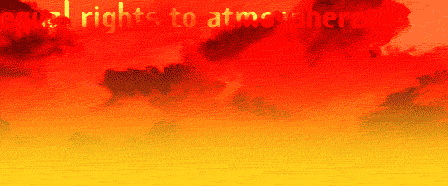
|
 |
 |
| |
|
Scene 8 Act Now!
It is October 23, 2002. New Delhi (India’s capital city) wakes up not only to a seasonal transition in its weather — it isn’t hot, but the weather hangs; earlier it used to be colder, crisper at this time of the year — but also to a moment in history. New Delhi is hosting the 8th Conference of Parties (CoP-8) to the United Nations Framework Conference on Climate Change (UNFCCC), starting today. Vigyan Bhavan, built in the centre of a city that respects only political clout, is the CoP-8 venue. It has been spruced up. Conference halls are ready to receive delegates from 185 nations (UNFCCC member-states, so goes the lingo). The tables, round and square, are gleaming. None of the seats sag. The microphones that amplify individual voices into national stances face the chair-heads. Alert Alsatians prodded on by duty-bound officers have smelt under seats and not found bombs placed by terrorists, real or imaginary. CCTV cameras, in place, are ready to whirr. Indeed, Vigyan Bhavan is doubly cloistered from the rest of the earth. It is now UN territory. Inside, the UN Police patrols; outside, the redoubtable Delhi Police. Everything is secure: Earth’s future can now be discussed, again. As CoP-8 begins, so Equity Watch resurrects itself. To observe, once more, exactly what it is that all these delegates do, or don’t. It was in 1992 that the world’s nations — responding to alarm calls from scientists about a global phenomenon called climate change, about a world that was warming up un-naturally, about devastating effects related to productive capacities and individual behaviours — signed a charter called the United Nations Framework Conference on Climate Change, or UNFCCC. In so doing they set themselves upon a fantastic course, a hitherto unimagined responsibility: crafting a global consensus to combat climate change. It was the first time in the history of human civilisation that such a consensus was required to be fashioned. It was the first time such a call was responded to, in so global a fashion. In this way was created an institution: the Conference of Parties, which would periodically get together to do the actual sculpting. In the last decade (1992-2002), 7 such conferences were held where nations strove to chisel a way out of global warming, and climate change. Forget the chisel. It is an instrument used delicately. Actually, nations took up the hammer and began hitting each other on the head. Climate change, from being a global ecological phenomenon, became a politically negotiated process. It became a Cost-Benefit Analysis process. CoP1 to CoP 7 has seen much hammering, and then sawing. What sawing. As CoP-8 begins, Equity Watch must resurrect itself. To not only observe, but also warn. Since 1997, when the UNFCCC’s Protocol to combat climate change was peremptorily rushed through at CoP-3 held in Kyoto, Japan, developing nations have found themselves at the receiving end of concentrated First World quick-fixes to climate change. Ecologically effective principles have given way to utilitarian economic mechanisms that threaten the growth trajectory of Third World nations. Co2lonialism has steadily become a reality. Developed nations have entreated, thrown tantrums, and threatened. All this to find any which way to off-load internal costs (cutting down on CO2 emissions, which means reformulating national energy-use, which means changing consumption patterns and behaviour), to avoid historical responsibility, and to meet carbon emission reduction targets in as cheap, and villainous, a fashion as possible. CoP-3 to CoP-7 is the story of a strange transformation of (broad) ecological responsibility into (narrow) economic efficiency and exchange. It is the story of heavily polluting nations imposing desperate diktats (related to their compliance problems) on to lesser-polluting countries that suddenly find themselves to be the object of blame and bribery, suddenly staring at an externally-determined, structurally-adjusted, benighted future. Much sawing has happened. The world is quite cut up, today. As CoP-8 begins, Equity Watch begins. To observe and warn.
And so to inform and guide. Produce knowledge that can help intervene. We have no
tinpot-dictatorial ambitions, like George Bush has. We aren’t toxic, or Texan. We
watch because we merely wish to remind: Foul ought to become fair. It will, it has to.
Equity will rule. But only if developing nations get in the ring. |
|
|||||
|
Copyright © Centre for Science and Environment